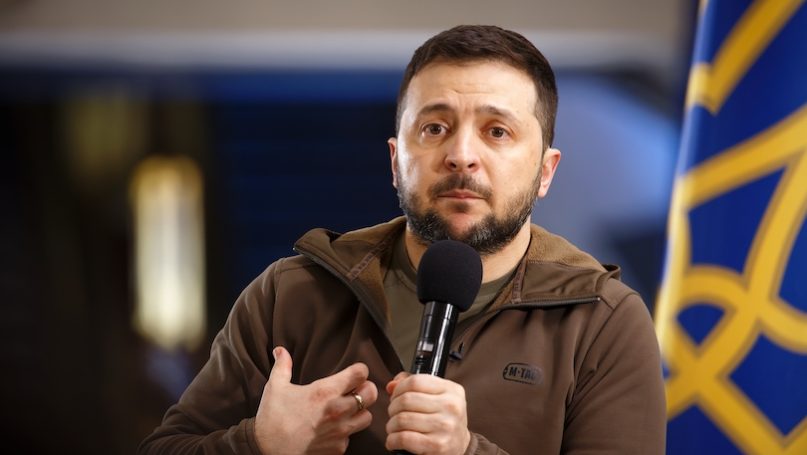Alexander Brotman

Ukrainian President Volodymyr Zelenskyy’s visit to Washington on 21 December was a momentous occasion both for Ukraine and for the United States. For Ukraine, it served to solidify its place on the international stage and cemented a critical alliance with the US and other NATO partners that is determined to pull Kyiv in a Euro-Atlantic direction. For Washington, it was a reminder of the immense power the US still has in the world after the turbulent Trump years, and that the United States remains the primary security guarantor in Europe. The conflict in Ukraine has demonstrated the indispensable nature of American power in crafting alliances of like-minded states to help defend the international order. As the new year dawns, much more needs to be done to support Ukraine and the conflict is far from over. However, Zelenskyy’s visit was an optimistic shot-in-the arm for two nations that were counted out in terms of their capabilities and influence but who now have pragmatic, realist-driven leaders at the helm.
Of Zelenskyy’s speech, two important points were raised that separate this moment from other periods in the post-Cold War era and serve to crystallise Ukraine’s geostrategic trajectory.
The first point was Zelenskyy’s adamant statement that the conflict must not become frozen, a reference to the post-Soviet frozen conflicts present from Moldova to Georgia that stifle the ability of states to move forward so long as a cold, yet unresolved peace with Russia remains. A frozen conflict because of a premature peace settlement would permanently stall Kyiv’s long march towards Europe and deny its citizens the Western identity they have sacrificed so much for in recent years. It may ease the tensions of a nuclear or third world war, but it would not ease the tensions for Ukrainians who would always be mindful of another Russian advance so long as a part of their country remains occupied. The decision by Zelenskyy to not make Ukraine ‘frozen’ grants Kyiv a degree of agency and legitimacy it has so far lacked as an independent state, marking a watershed moment for Russian influence in the post-Soviet space.
Zelenskyy’s second point related to the massive amounts of military aid that Washington has provided, noting that it is not charity but an investment in global security. For all of Europe’s capabilities and investments in Ukraine, the US is still the principal security actor and guarantor in Europe, a region it may want to pivot away from but for which it remains inextricably linked. If the conflict in Ukraine is a precursor to the final collapse of the Soviet Union as some scholars have argued, Washington’s leadership within NATO and support for other post-Soviet countries like Moldova, Georgia, and Kazakhstan will remain critical. Ukraine’s conflict is a post-Soviet war of independence, something that the West must match with a steely-eyed perspective towards Russia having witnessed its inability to reform into a Western-style liberal democracy and market economy over the past 30 years. The time is now to safeguard the post-Soviet space for all eventualities and to ensure that tangible prospects for both EU and NATO membership are on the table should national governments decide to pursue it.
2022 began with the widely held belief that a Russian invasion of Ukraine was unlikely – and if it did happen, Kyiv would fall within a matter of days. Ukraine was underestimated in the West and the will of the Ukrainian people an unmeasured quantity for military planners and analysts from Washington to London and Berlin. As a result of its invasion, the Russian world is shrinking, Ukraine has gained numerous international allies, and the US remains the lead economic and military power in a unipolar world marked by persistent attempts at multipolarity.
President Zelenskyy visited Washington with the confidence of a wartime leader who knows where his country is headed and what tools are required in order to get there. The comparisons to Churchill’s address to Congress in December 1941 may not be entirely apt, but Zelenskyy certainly met a receptive audience. The U.S. loves to root for the underdog that is fighting for its independence and defies the odds at every turn. In supporting Zelenskyy, the US is supporting the maintenance of the global order it helped create and reaffirming a benevolent unipolarity that is capable of drawing states into its orbit rather than away from it.
The triumph of Ukraine is that it shows the power of values and destiny in international politics, and the limits of hard power tools if they are not matched with the wisdom of idealistic and persuasive leaders. In the midst of tragedy, Ukraine offers unbridled hope. Kyiv’s coming victory and the waning influence of Russia across large swathes of Eurasia and Eastern Europe will be a triumphant geopolitical event, eclipsing the impact of Moscow’s initial invasion on 24 February. With continued US and allied support, and continued Ukrainian battlefield victories, 2023 can be the year in which Ukraine gains true independence and Moscow true isolation without any allusions or misperceptions as to the true characters of both states.
No comments:
Post a Comment